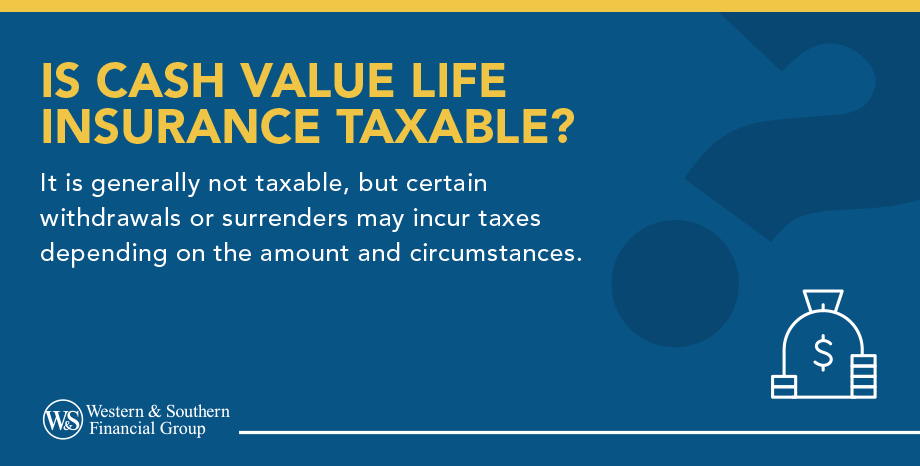
Cash value life insurance is generally not taxable as it grows within the policy. However, taxes may apply to withdrawals, loans, or surrenders that exceed the total premium payments made, so it's essential to understand the specific rules and consult a tax advisor for guidance.
Updated June 10, 2024
As you review your life insurance coverage, it's smart to consider how taxes might affect any benefits you or your loved ones receive. For most people using life insurance as a financial cushion in the event a family member's death, taxes might not be an issue. But depending on how you use your policy, you could potentially face tax consequences. Here's what you need to know.
Permanent life insurance policies typically include a cash value, which can be borrowed against and potentially used to pay the premium or purchase an annuity. The cash value has the potential to grow over time and accrue interest. Annual cash value growth in a life insurance policy is not usually taxable.
Withdrawals from a permanent policy can also be tax-friendly, but it's crucial to know the rules and review your strategy with a CPA before taking action. So, when is the cash value of life insurance taxable? Here are a few elements to keep in mind:
Build secure cash value with life insurance. Get a FREE Life Quote.
Overfunded life insurance occurs when you pay more money than the minimum premium amount required into the policy. By overfunding permanent life insurance policies, which include whole life and universal life, you can typically grow your cash value. Here are some situations in which you might want to consider overfunding a life insurance policy.
Beneficiaries who receive a death benefit as a lump sum typically do not need to pay income taxes on that payout. However, beneficiaries may have several options available to them, and they could owe taxes on any earnings from a life insurance payout.
Insurance companies often pay interest when beneficiaries refrain from accessing the proceeds of a policy. Those interest earnings are usually reported on each beneficiary's annual tax return and may result in taxes due.
Life insurance is generally exempt from taxes when your beneficiaries are paid the death benefit; your cash value increases; you borrow money from your cash value; you withdraw cash value, but it’s less than what you paid in premiums; or you exchange your life insurance for a different policy or an annuity.
Life insurance can be taxed when your beneficiaries owe estate or inheritance taxes, you cancel or lapse a policy with cash value worth more than you paid, you have an outstanding policy loan when you cancel or lapse your policy or your policy is a modified endowment contract.
For some, receiving a large amount of money — especially after the death of a loved one — can be disorienting. They may need some time to decide what to do with the money, so waiting can help beneficiaries avoid rash decisions.
Meanwhile, other people may choose to take periodic payments from the proceeds of a life insurance policy (instead of taking a lump sum). These payments can reduce the chances of beneficiaries spending all of their money too quickly. Plus, defined payments make it easy to budget during the coming months and years, potentially replacing the monthly income that the deceased family member once contributed. Interest payments are taxable when withdrawn.
There may be other situations that create a tax liability, although many people — especially those who use life insurance simply to protect against the loss of a wage-earning parent — are unlikely to meet those criteria. Still, it can be helpful to speak with your tax advisor and insurance professional before buying or changing a life insurance policy.
Tip
In certain circumstances, the death benefit that life insurance can provide may incur no taxes.
Likewise, policy owners may be able to use the cash value from a policy without owing taxes. However, loans, withdrawals, and surrenders can potentially cause tax consequences, so it's critical to review your plans with a CPA. You may not be able to avoid taxes entirely, but avoiding surprises can make life easier for you and your loved ones.
Understand your life insurance tax perks. Talk to a Financial Professional.
Sources









































Information provided is general and educational in nature, and all products or services discussed may not be provided by Western & Southern Financial Group or its member companies (“the Company”). The information is not intended to be, and should not be construed as, legal or tax advice. The Company does not provide legal or tax advice. Laws of a specific state or laws relevant to a particular situation may affect the applicability, accuracy, or completeness of this information. Federal and state laws and regulations are complex and are subject to change. The Company makes no warranties with regard to the information or results obtained by its use. The Company disclaims any liability arising out of your use of, or reliance on, the information. Consult an attorney or tax advisor regarding your specific legal or tax situation.
![]()
Monday - Friday | 8 a.m. - 6 p.m. ET
Saturday | Closed
Sunday | Closed
Holidays | Closed
© 2017-2024 Western & Southern Financial Group, Inc.
Western & Southern is the marketing name for a group of diversified financial services businesses composed of Western & Southern Financial Group and its seven life insurance subsidiaries. Life insurance and annuity products may be issued by The Western and Southern Life Insurance Company, Western-Southern Life Assurance Company, Columbus Life Insurance Company, Integrity Life Insurance Company, The Lafayette Life Insurance Company, National Integrity Life Insurance Company or Gerber Life Insurance Company. Products and services referenced in this website are provided through multiple companies. Each company has financial responsibility only for its own products and services, and is not responsible for the products and services provided by the other companies. Not all products and services are available in all states. All companies are members of Western & Southern Financial Group and are located in Cincinnati, OH with the exception of National Integrity and Gerber Life, which are located in White Plains, NY.
This site is intended to provide a general overview of our products and services. Please review the details of each product with your financial representative to determine which options may best fit your needs.
Western & Southern Financial Group does not provide tax or legal advice. Please contact your tax or legal advisor regarding your situation. The information provided is for educational purposes only.
1 Superior ability to meet ongoing insurance obligations (second highest of 13 ratings; rating held since June 2009 for six out of seven of Western & Southern Financial Group’s life insurance subsidiaries, rating held since February 2024 for Gerber Life). Gerber Life is not rated by other rating agencies.
2 Very strong financial security characteristics (fourth highest of 21 ratings; rating held since August 2018)
3 Very strong capacity to meet policyholder and contract obligations on a timely basis (third highest of 21 ratings; rating held since June 2009)
4 Excellent financial security (fourth highest of 21 ratings; rating held since February 2009)
5 The Comdex Ranking is a composite of all the ratings a company has received from the major rating agencies. It ranks insurers on a scale of 1 to 100 (where 1 is the lowest) in an effort to reduce confusion over ratings because each rating agency uses a different scale.
Financial strength ratings apply to the individual member insurance companies affiliated with Western & Southern. Gerber Life is rated only by A.M. Best. The Lafayette Life Insurance Company is not rated by Moody’s.
This may contain information obtained from third-parties, including ratings from credit ratings agencies such as Standard & Poor’s. Reproduction and distribution of third-party content in any form is prohibited except with the prior written permission of the related third-party. Third-party content providers do not guarantee the accuracy, completeness, timeliness or availability of any information, including ratings, and are not responsible for any errors or omissions (negligent or otherwise), regardless of the cause, or for the results obtained from the use of such content. THIRD-PARTY CONTENT PROVIDERS GIVE NO EXPRESS OR IMPLIED WARRANTIES, INCLUDING, BUT NOT LIMITED TO, ANY WARRANTIES OF MERCHANTABILITY OR FITNESS FOR A PARTICULAR PURPOSE OR USE. THIRD-PARTY CONTENT PROVIDERS SHALL NOT BE LIABLE FOR ANY DIRECT, INDIRECT, INCIDENTAL, EXEMPLARY, COMPENSATORY, PUNITIVE, SPECIAL OR CONSEQUENTIAL DAMAGES, COSTS, EXPENSES, LEGAL FEES OR LOSSES (INCLUDING LOST INCOME OR PROFITS AND OPPORTUNITY COSTS OR LOSSES CAUSED BY NEGLIGENCE) IN CONNECTION WITH ANY USE OF THEIR CONTENT, INCLUDING RATINGS. Credit ratings are statements of opinions and are not statements of fact or recommendations to purchase, hold or sell securities. They do not address the suitability of securities or the suitability of securities for investment purposes, and should not be relied on as investment advice. Ratings are subject to change from time to time. The ratings shown here are correct as of February 20, 2024.
Gerber Life Insurance is a trademark. Used under license from Société des Produits Nestlé S.A. and Gerber Products Company.